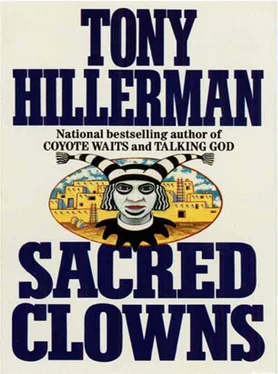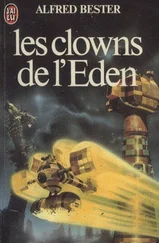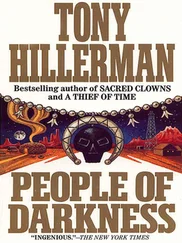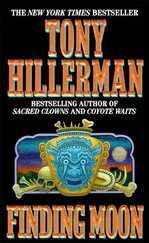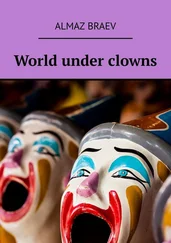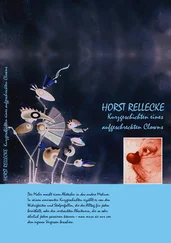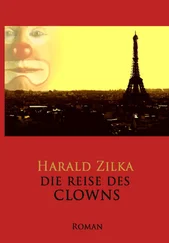“Did he have any idea? Could he tell you anything helpful?”
“He was sure he didn’t know about my grandfather’s clans, because Grandfather had died before they moved. When Dad was just a little boy. But he said he thought his mother might have belonged to the Hunger People. He said he remembered her joking about that. Saying it was appropriate for their family.”
Chee probed through his memory. “Hunger People,” he said. “That’s the Dichin Dine’e .”
Janet sensed his mood.
“Why all the questions?” she said. There was no snuggling now. “As if I hadn’t been out here long enough to know the answer to that one.” She pushed herself away from him. “Well,” she said. “How did I do? Am I eligible?” She laughed as she said it.
“I’m like your dad,” Chee said. “I’m not sure. Maybe I’m poison for you.” He tried to make it sound like a joke.
They sat in the cold moonlight. Janet sighed. “You know what?” she said. “I have a long day tomorrow. And you have to do whatever you policemen do on Tuesdays. So, if I can think of a way to get you out of the car, I’ll go on home and get some sleep.”
This was not the way Chee wanted this evening to end. He wasn’t ready to step out into the cold night.
“I want to ask you about something,” he said. “Did you notice when we were-”
“No more questions, Jim. I don’t feel like any more questions.”
“This one’s about Blizzard,” he said. “Did you notice how different his reaction was to some of the scenes in that movie? We Navajos would be laughing and honking our horns at our private joke, and he would be looking sad. Same scene, exactly. He’d be watching the destruction of his culture. We’d be watching our kinfolks making fun of the white folks in the movie.”
“Different for me, too,” Janet said. “My Navajo wasn’t good enough to get the joke most of the time.” She frowned at him. “How do you know how Blizzard was taking it? You were watching him in the rearview mirror, weren’t you?”
“Yeah,” Chee said.
“And me too, I bet.”
“Mostly you,” Chee admitted.
“Sneaky,” Janet said. “Why watch us?”
He wanted to say Because you’re beautiful. Because it makes me feel good to look at you. Because I have stupidly, hopelessly, allowed myself to fall in love with you. But he didn’t say it. There was the problem of the Dichin Dine’e . Was his memory correct? Was there some linkage of that little clan and one of his own? A long time ago, on a winter night when such teaching is appropriate, Hosteen Frank Sam Nakai, his Little Father, had given him the history of his Slow Talking People – tracing it all the way back to the mythic times just after Changing Woman had left The People to rejoin her lover, the Sun. He had been a boy then, and some of the clan connections had seemed vague and unimportant. But now the name of the Hunger People stirred something in his memory. And now it had become terribly important. It determined whether Jim Chee and Janet Pete were permissible as friends but taboo as lovers.
So instead of saying what he wanted to say, he said, “I was thinking about you and me and Cowboy sitting on the roof at Tano – watching the kachina dance. Cowboy’s Hopi, and he’s in one of the Hopi kachina societies himself, so he saw a lot that we missed. But not as much as the Tano people. All of us up there on the roof were outsiders, I mean. Like the Cheyenne watching the Navajos pretending to be Cheyennes. He missed a lot. We missed a lot, too. I wonder what.”
“Me, too,” Janet said, voice glum. “I mean, me and Blizzard, too. There was a lot I didn’t understand at the movie. Not understanding Navajo very well. And to tell the truth, not understanding about being a Navajo.”
Chee studied her profile. He realized, abruptly and with shock, that she was trying not to cry. He experienced a sudden jarring enlightenment. He was seeing a Janet Pete he had never even dreamed existed. He was seeing a lonely girl. He, who had been a sheep camp boy surrounded by the town kids in boarding school; he, who had been the country bumpkin among the sophisticates at the University of New Mexico; he, of all people, should have recognized what Janet would have encountered on this Big-Reservation-Full-of-Strangers. But he hadn’t. He had seen only the shrewd attorney who looked great in expensive clothing, who wore the armor of wit, humor, education, intelligence. He hadn’t seen the girl who was trying to find a home. He felt an almost overpowering urge to pull Janet Pete to him, wrap his arms around her, comfort her, warm her against this cold moonlight, tell her he understood, tell her that he loved her and would care for her forever, and would die to make her happy.
Almost overpowering. He could have done it a week ago when they were friends. Now there was the question of the Hunger People. They had moved into that territory beyond friendship and Chee didn’t know the way back. If there was a way. Perhaps there was, but Chee couldn’t think of it. So he simply looked at her profile, as she sat, forlorn, shoulders slumped, staring out the windshield. And he said:
“Remember at Tano? The koshare had come tumbling down off their roof and a couple of them had grabbed one of the kachinas. They were doing a lot of loud talking, gesturing, that sort of thing. And the crowd was laughing. Good-natured. Everybody was having fun. Getting into what was going on. And then the clown came in dressed up like a cowboy, riding the stick horse. And the clown with the little toy wagon, selling their stuff to the guy dressed up like he was supposed to be a tourist, or a trader. And remember, sort of suddenly the laughing stopped there for a moment. Everything got quiet.”
“Okay,” Janet said. “Okay. I remember.”
“I wonder what we missed,” Chee said. “I wonder what that meant.”
“I don’t know what that meant,” Janet said. “I have no idea. But I guess this conversation we’re having right now means we have reverted back to our traditional status.”
“Traditional status?”
“Back to being old friends,” Janet said. “Good buddies. Remember? Back to telling each other our troubles. Giving each other all sorts of bad advice. About our love affairs with other people.”
“I wouldn’t say that,” Chee said. He couldn’t think of anything more sensible to say. “But don’t you have any ideas about what might have been going on there at Tano? Any-”
Janet leaned across him and opened his door. “Out,” she said. “Go to bed. Be a cop tomorrow.”
In the trailer, Chee dropped on his bunk still in his jacket and boots and managed not to think of Janet Pete. He thought of the Todachene case. The case without leads. He considered where it had happened-on a light-traffic byway used mostly by reservation locals. That meant the driver was probably a Navajo. No matter how drunk he’d been, he must be aware by now of the nature of his crime. He would feel the guilt. It would force him out of hozho , out of that state of harmony which is the goal of Navajo metaphysics. If he was traditional, he would be calling on a shaman for help. Tomorrow, Chee thought, he would begin putting out the word to the medicine people in the Checkerboard and on the northeast side of the Big Rez. If he was patient, maybe some information would come drifting back. A ceremonial cure for a man who had been involved with death. The man was probably a drunk, someone who had left the Navajo Way. But it was worth a try.
The second thing he would do tomorrow would be to provide the lieutenant with a memo about the Sayesva homicide. Leaphorn had made it clear he didn’t want Chee intruding in that very federal, very off-reservation affair. But rigid as he was, Leaphorn was also smart. He’d earned his reputation. The memo would inform the lieutenant that something odd seemed to have transpired at the Tano ceremonial, something involving the performance of the clowns. Leaphorn could take it from there.
Читать дальше
